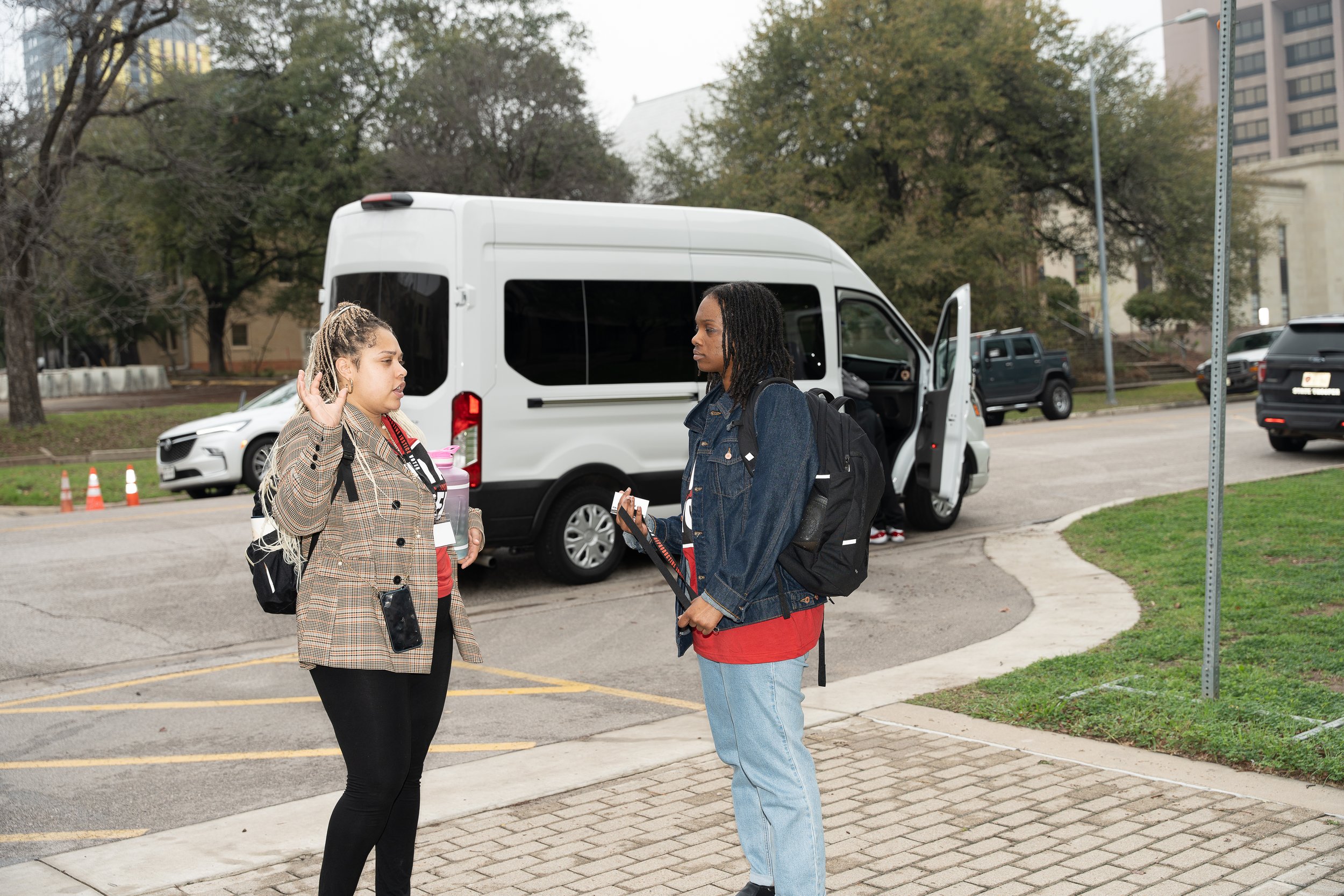At The Afiya Center, we believe that Reproductive Justice begins at the ballot box. That’s why we’re proud to be a partner of the I Am A Reproductive Justice Voter campaign with In Our Own Voice: National Black Women’s Reproductive Justice Agenda.
This campaign is about more than just voting—it’s about power. It’s about making sure that Black womxn, girls, and gender-expansive folks—the very people most impacted by harmful policies—are front and center in the fight for change.
Far too often, our communities are left out of the political process. But our lives, our health, and our futures are on the line in every election. From access to healthcare and maternal care to education, economic justice, and beyond—Reproductive Justice is on the ballot.
Even though Advocacy Day has passed, the work continues. We’re still organizing, building power, and holding our elected officials accountable.
Be loud. Be bold. Be a Reproductive Justice Voter.
📬 Stay connected. Sign up for our newsletter to get updates on elections, policy changes, and ways you can take action: [Insert newsletter signup link]
✊🏿 Say it with us: I Am A Reproductive Justice Voter!
What We're Fighting For This Session
🔬 HIV Decriminalization
Bill: HB 1459 (Rep. Venton Jones)
Summary: Clarifies what counts as a “deadly weapon” in prosecutions involving HIV/AIDS to prevent the misuse of health status in criminal cases.
Why It Matters: This bill could reshape how HIV is treated under the law, moving away from stigma and toward health-informed justice.
🏥 Abortion Access
Bill: HB 257 (Rep. Howard) | Companion: SB 256 (Sen. Alvarado)
Summary: Expands exceptions to Texas’s abortion bans and repeals outdated laws restricting abortion.
Why It Matters: This bill helps restore access to critical reproductive care, especially in cases involving health risks and fetal abnormalities.
🗳️ Voting Rights
Bill: HB 695 (Rep. Leo Wilson)
Summary: Sets clearer rules for polling place operations, electioneering, and voter access.
Why It Matters: Protects the neutrality and accessibility of voting spaces—so everyone has a fair shot at making their voice heard.
🤰🏾 Maternal Health & Doula Coverage
Bill: HB 1201 (Rep. Manuel)
Summary: Creates a pilot program to provide Medicaid coverage for doula services.
Why It Matters: Tackles maternal mortality by investing in culturally responsive care and support during pregnancy.
⚖️ Decriminalization of Black Bodies
Bill: HB 1363 (Rep. Hernandez)
Summary: Requires implicit bias training for judges, attorneys, and court staff.
Why It Matters: Aims to reduce racial bias and promote fairness across the legal system.
🚫 "Kill Nonprofits" Bill
Bill: H.R. 9495 (awaiting new number)
Summary: Gives the U.S. Treasury power to revoke nonprofit status by labeling organizations as "terrorist-supporting"—without due process.
Why It Matters: This bill threatens civil society and could be used to silence advocacy organizations, especially those led by Black and Brown communities.
Status: Passed the House (Nov. 21, 2024); pending in the Senate.
The Afiya Center BELIEVES:
Reproductive Justice is a fundamental right deserved by all folk, including those who choose to or not to have children and those who do not have the ability to have children yet still participate as parents, guardians, caregivers, and trusted advisors. Our theory of political change is: if we engage politically disengaged folk from our community in the electoral process by; 1) registering them to vote, 2) giving them access to easily digestible information on current local candidates and the legislative process, and 3) and providing them with multiple opportunities to become civically involved via social media campaigns, advocacy academy, volunteering at the legislative sessions, and hosting local conversations- all without compromising their personal priorities; we can increase voter turnout within these constituent groups and our ability to influence policy relevant to needs and experiences of low-income, Black womxn and gender-expansive people who exist in communities that are disproportionately impacted by systemic financial, healthcare, educational, racial, sexual, and environmental oppression. We believe these actions will support our daily mission of establishing reproductive safety and justice for Black womxn and girls across the US, in everybody and identity they occupy.
An RJ Voter Stands Behind and Values the Principles of:
-
Texas’ abortion bans disproportionately affects Black women, who already face higher risks of health complications or death related to pregnancy or childbirth. Taking away the right to full bodily autonomy guides us towards a higher risk of health complications and mortality, higher teen pregnancy rates and increased financial burdens. Abortion care is healthcare. It is vital we do not separate it from human and reproductive rights. We trust Black folks to make the important personal decisions that are best for themselves and their families. We support access to abortion care, including having insurance coverage, so every woman – regardless of her income – can access affordable and safe abortion care when she needs it.
-
Texans are negatively impacted by pollution and climate change every single day in which these impacts are not distributed evenly. The most vulnerable communities are also the most likely to be exposed to polluted air and water. Across the state, pollution hotspots are concentrated around the places that low-income and black populations call home. Acknowledging and combating what is destructive to our climate and tackling what is hurting our communities. We believe that every individual has the human right to clean air, safe water and a clean environment.
-
In the state of Texas, Black womens' median annual earnings is $30,172 while white, non-Hispanic mens' median annual earnings is $55,000. We support equal pay, living wages, and economic policies that ensure an opportunity for all people to achieve strong financial security for all people regardless of race, gender, sexual identity, and socio-economic status. We value acknowledging the economic disparities and fighting towards equity.
-
According to the 2020 US Census Bureau, Blacks accounted for 26% of individuals who were searched. It is worth noting that Blacks comprise only about 13% of the Texas population. We believe in standing in unity with our sisters and brothers around the country who are marching and protesting against police brutality. We call for an end to state-sanctioned violence against Black people and demand equal justice under the law for all. That includes working to build a grassroots movement in support of our issues, laying the foundation for ongoing policy change at the national and state levels to tackle decriminalization.
-
Texas ranks in the bottom quarter of the states when it comes to both access to and quality of care for Black folks, hinting at deep-seated racial and ethnic health inequities. Texas also ranks in the 22nd percentile for the health system’s treatment of Black folks, putting it in the bottom fourth. It ranked in the 63rd percentile for the treatment of whites, putting it in the top 40 percent. We reject any attempt to roll back health care coverage and protections, including eliminating coverage for pre-existing conditions, changes to Essential Benefits, cuts to Medicaid or Medicare and COVID-19 relief legislation because Blacks folks face disproportionately high COVID-19 death rates and are more likely to live in areas experiencing outbreaks than their counterparts.
-
Texas has repeatedly introduced bills aimed at barring trans people from public bathrooms, athletics, and more. Although many of these bills have fortunately not been passed into law, the frequency of transphobic rhetoric in statehouses and media only serves to normalize anti-trans sentiment throughout the state. In Texas, 57% of the reported victims of fatal transphobic violence were Black. The dual impact of systemic homophobia and racism can harm Black women, femmes, queer, trans and gender non-conforming people. We support programs and policies that ensure Black LGBTQ+ individuals, including youth, have the resources and the right to make healthy decisions about their lives, bodies, gender, and sexuality.
-
In the state of Texas, Black pregnant preterm birth rates are 41 percent higher than any other race. The United States has the highest maternal death rate of all industrialized nations and is among the most dangerous places in the world to give birth. Black women in the U.S. are three to five times more likely to experience a pregnancy-related death than their white counterparts. This is not only a public health crisis but a moral one as well. Black women continue to be ignored in policy conversations. The limiting of reproductive choices has been especially harmful to Black women, we believe the continued funding cuts and unreasonable restrictions upon women's access to healthcare have resulted in poor maternal health outcomes for Black women. We support Black women’s access to high-quality, affordable health care before, during, and after pregnancy as a critical component of our human rights.
-
In Texas, the rate of Black women living with HIV is 7.4 times the rate of Hispanic women living with HIV and 14.1 times the rate of white women living with HIV. Among the major racial and ethnic groups in Texas, Black Texans have the greatest number of their population who are not receiving HIV medical care. Over one in four Black women with HIV were out of care in 2018. This represents 30% of Black women, not in care across the state of Texas. We all need to be alarmed at what is happening to us, ending the divisiveness, demanding that policy leaders stop playing politics with our lives and continue to advocate for ourselves. We support life-enriching programs that address the socioeconomic disparities among Black women who are at risk or living with HIV and the decriminalization of those as well.
-
The most common misdemeanors for which students are ticketed in Texas public schools are non-violent Disruption of Class or Transportation, Disorderly Conduct, and curfew violations (leaving campus without permission). We reject zero-tolerance policies that feed into the School-to-Prison Pipeline. School provides the stepping-stone to post-secondary education and employment opportunities later in life. We support the right to achieve academic excellence in a safe, and dignified environment. We support young Black girls receiving an education that prepares them for careers of their choosing and empowers them to feel that their lives are worthy.
-
Black women are the largest voting constituency in the American electorate. Every year, we register voters, organize our communities, and deliver the votes that give so many local, state, and national politicians their jobs. We will continue to use the power of the ballot to elect those who understand our lived experiences, prioritize our interests, and respect our basic human rights. And we will hold elected officials accountable.














